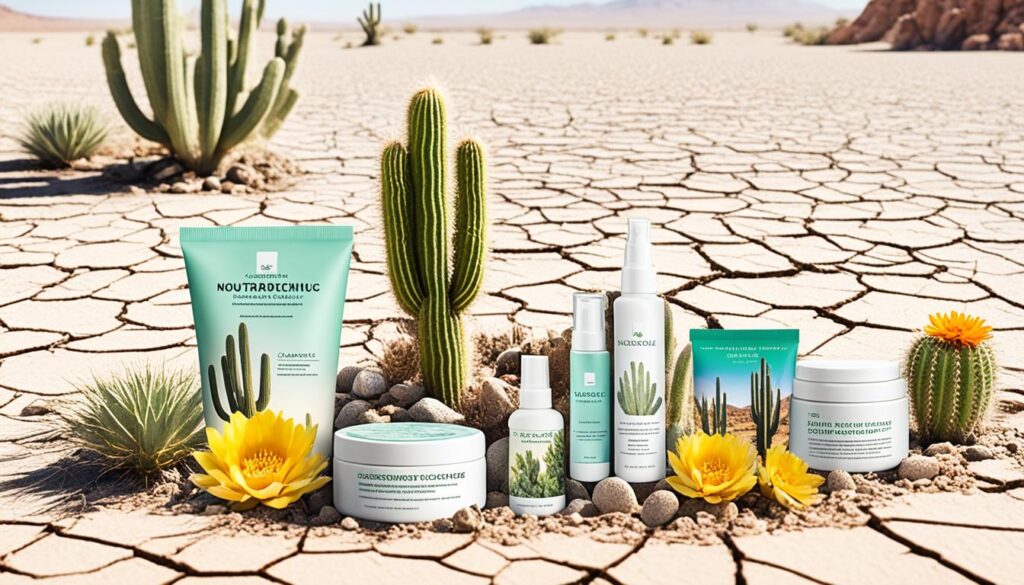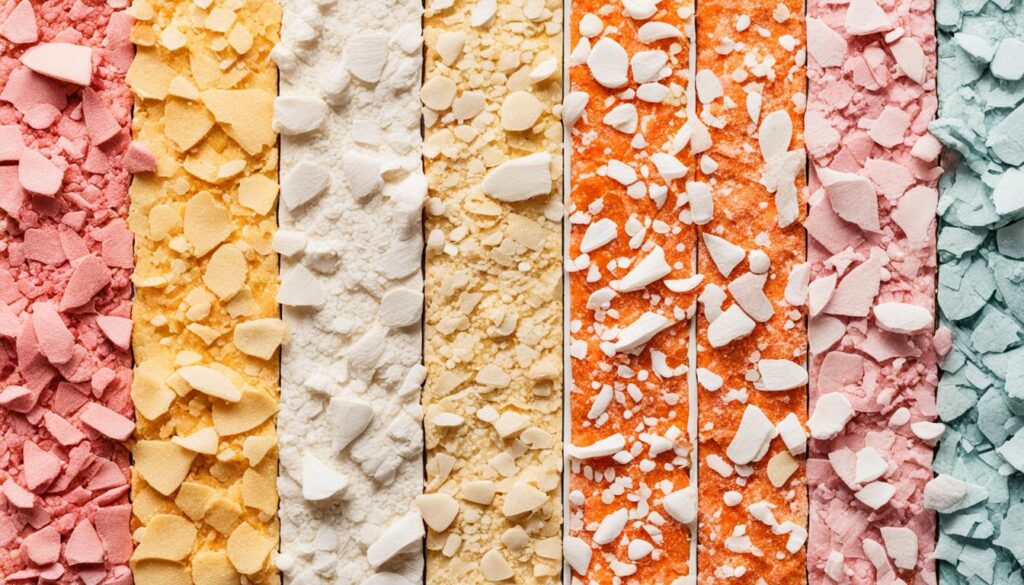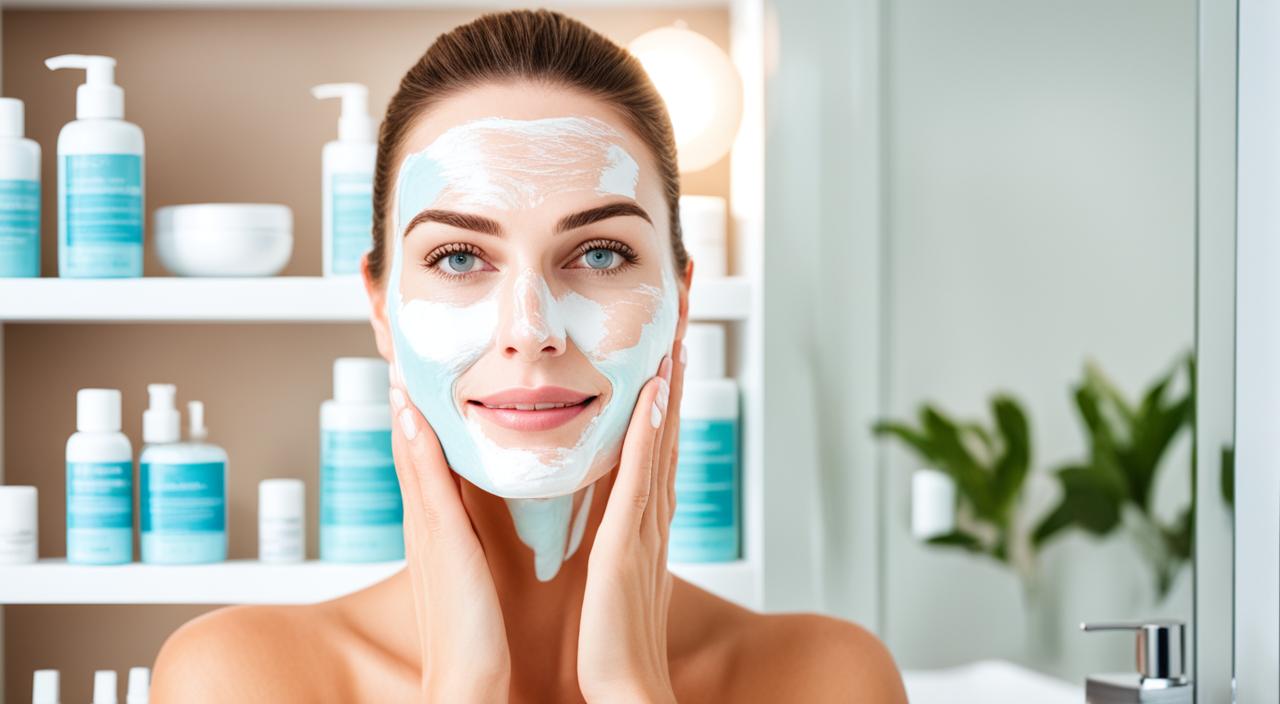Skincare Routine For Dry And Sensitive Skin

If you have dry and sensitive skin, you know how challenging it can be to find the right skincare routine that provides the necessary hydration and soothes your delicate skin. Dry skin lacks moisture, resulting in dryness, roughness, and flakiness. It is important to develop a skincare routine that addresses the specific needs of dry and sensitive skin and incorporates hydrating ingredients to keep your skin healthy and nourished.
When designing a skincare routine for dry and sensitive skin, it is crucial to choose products that are gentle and formulated to provide intense hydration. Look for skincare products that contain moisturizing ingredients like ceramides, hyaluronic acid, and glycerin. These ingredients help replenish the skin’s moisture levels, improve hydration, and strengthen the skin’s natural barrier.
In addition to the basic skincare routine of cleansing, moisturizing, and sun protection, there are other products that can benefit dry and sensitive skin. Toners with hydrating and soothing ingredients, serums with hydrating actives like hyaluronic acid and B vitamins, eye creams with hydrating peptides, and rich moisturizers with ingredients like ceramides and niacinamide can provide extra nourishment and hydration to your skin.
Don’t forget the importance of sunscreen in your skincare routine. Protecting your skin from harmful UV rays is essential, especially for dry and sensitive skin. Look for a broad-spectrum sunscreen with a high SPF to ensure adequate sun protection.
By building a skincare routine that incorporates these products and ingredients, you can effectively hydrate and soothe your dry and sensitive skin, keeping it healthy, nourished, and protected. Remember to be consistent with your skincare routine and, if needed, consult with a dermatologist for personalized recommendations and guidance.
Key Takeaways:
- Dry and sensitive skin requires a skincare routine that focuses on hydration and soothing.
- Choose skincare products with moisturizing ingredients like ceramides, hyaluronic acid, and glycerin.
- Add toners, serums, and eye creams with hydrating properties to your routine for extra nourishment.
- Don’t forget to protect your skin from UV rays by applying a broad-spectrum sunscreen.
- Consistency in your skincare routine is key to keeping your dry and sensitive skin healthy and nourished.
Understanding Dry Skin
Dry skin, or xerosis, is a skin type that lacks sufficient moisture. It can be caused by various factors such as cold weather, low humidity levels, and central heating. Additionally, certain skin conditions like eczema can contribute to dryness. When the skin lacks moisture, it may feel itchy, cracked, rough, tight, flaky, or scaly.
Dry skin occurs when the skin’s protective barrier loses water too quickly. The skin barrier, also known as the stratum corneum, plays a crucial role in maintaining the skin’s hydration levels by preventing excessive water loss and protecting against environmental irritants. When the skin barrier is compromised, it leads to dehydration, making the skin more prone to dryness and sensitivity.
Understanding the causes of dry skin is essential in effectively addressing the issue and maintaining skin hydration. By identifying the underlying factors contributing to dryness, individuals can tailor their skincare routines and incorporate targeted products to replenish moisture, repair the skin barrier, and alleviate symptoms of dry skin.
“Dry skin occurs when the skin’s protective barrier loses water too quickly.”
Some common causes of dry skin include:
- Low humidity levels: Dry climates or indoor heating can sap moisture from the skin, leading to dryness.
- Harsh weather conditions: Cold temperatures and windy weather can strip the skin’s natural oils and cause dryness.
- Hot showers or baths: Prolonged exposure to hot water can deplete the skin’s natural oils and disrupt its moisture balance.
- Certain skin conditions: Conditions like eczema and psoriasis can impair the skin’s ability to retain moisture, resulting in dryness and irritation.
- Aging: As we age, the skin’s natural ability to retain moisture decreases, making it more susceptible to dryness.
Addressing dry skin involves not only hydrating the skin but also focusing on repairing and strengthening the skin barrier. By incorporating products with hydrating ingredients like hyaluronic acid, ceramides, and glycerin into the skincare routine, individuals can replenish moisture and restore the skin’s natural protective barrier.
The Importance of Hydration
Proper hydration is crucial for maintaining healthy skin. Hydrated skin not only feels more comfortable but also appears smoother, plumper, and more radiant. When the skin is adequately hydrated, it helps improve its overall function, including barrier protection, cell turnover, and collagen production.
A well-hydrated skin barrier acts as a shield against external aggressors, preventing irritants from penetrating the skin and causing dryness or inflammation. It also helps maintain the skin’s natural pH balance and supports the skin’s microbiome, the beneficial microorganisms that reside on the skin’s surface.
Hydrating the skin goes beyond simply drinking water; it requires the use of skincare products that effectively lock in moisture and prevent water loss. Incorporating hydrating ingredients like hyaluronic acid, glycerin, and ceramides into the skincare routine can help improve the skin’s hydration levels and promote a healthier, more radiant complexion.
By understanding the characteristics of dry skin and the factors that contribute to its development, individuals can make informed choices when it comes to skincare products and routines. With proper hydration and a focus on restoring the skin barrier, dry skin can be effectively managed, resulting in healthier, more hydrated skin.
Morning Skincare Routine for Dry and Sensitive Skin

A good morning skincare routine for dry and sensitive skin is essential to start the day with a hydrated and protected complexion. By incorporating gentle and moisturizing products, you can nourish your skin and maintain its health and beauty. Here’s a step-by-step guide to the ideal morning skincare routine for dry and sensitive skin:
- Gentle Cleansers: Begin your morning routine with a gentle cleanser that effectively removes impurities without stripping away essential oils. Look for moisturizing cleansers with ingredients like glycerin, ceramides, and hyaluronic acid, which help to hydrate and nourish the skin.
- Hydrating Toners: Follow cleansing with a hydrating toner that is alcohol-free. Hydrating toners help to remove any remaining grime or residue from the skin, while adding an extra boost of moisture. Look for toners with hydrating and soothing ingredients to calm and prep your skin for the next steps.
- Hyaluronic Acid Serums: Hyaluronic acid serums are a game-changer for dry and sensitive skin. These serums draw moisture into the skin, providing intense hydration and plumping effects. Apply a few drops of hyaluronic acid serum onto your face and gently pat it in.
- Moisturizers for Dry Skin: Choose a moisturizer specifically formulated for dry skin. Look for ingredients like ceramides and niacinamide, which help to lock in moisture and repair the skin barrier. Apply your moisturizer in gentle upward strokes, focusing on areas prone to dryness.
- Sunscreen: Complete your morning skincare routine by applying sunscreen with a high SPF. Sunscreen is crucial for protecting your skin from harmful UV rays, as dry and sensitive skin can be more vulnerable to sun damage. Look for broad-spectrum sunscreens that offer both UVA and UVB protection.
Following this morning skincare routine will hydrate and nourish your dry and sensitive skin, preparing it for the day ahead. Remember to choose products that are specifically formulated for your skin type, and always prioritize gentle and moisturizing options. Now, you’re ready to face the day with healthy and radiant skin!
Evening Skincare Routine for Dry and Sensitive Skin

Creating an effective evening skincare routine is vital for maintaining the health and hydration of dry and sensitive skin. This routine focuses on gentle cleansing, hydration, and nourishment to restore moisture and promote skin renewal. Here are the key steps to follow:
Step 1: Double Cleanse
Start your evening skincare routine with a double cleanse using either an oil cleanser or a moisturizing cleanser. This helps to remove makeup, dirt, and grime accumulated throughout the day. Oil cleansers are particularly beneficial for dry skin as they help to dissolve and lift away impurities without stripping the skin of its natural oils.
Step 2: Hydrating Toner
Prep your skin for the next steps by applying a hydrating toner. Look for toners that are alcohol-free and contain hydrating ingredients like hyaluronic acid or glycerin. Toners help to restore the skin’s pH balance, remove any remaining traces of dirt, and provide an additional layer of hydration.
Step 3: Exfoliating Serum
Exfoliating serums with ingredients like AHAs (alpha hydroxy acids) can be beneficial for dry and sensitive skin, helping to remove dead skin cells and improve skin texture. However, it’s important to choose a gentle exfoliating serum and avoid over-exfoliation, as it can cause irritation. Incorporate this step into your routine 2-3 times a week and monitor how your skin responds.
Step 4: Retinol Treatment (Optional)
If your skin tolerates it well, consider incorporating a retinol treatment into your evening routine. Retinol stimulates cell turnover, promotes collagen production, and improves overall skin texture. Start with a low concentration and gradually increase the frequency of use to avoid irritation. It’s advisable to consult with a dermatologist before introducing retinol into your skincare routine.
Step 5: Night Cream
Apply a rich and nourishing night cream to replenish moisture while you sleep. Look for night creams that contain hyaluronic acid and other hydrating ingredients like ceramides or squalane oil. These ingredients help to lock in moisture and strengthen the skin’s protective barrier, promoting overnight hydration and repair.
Step 6: Lip Care
Don’t forget to give your lips some TLC before bed. Apply a moisturizing lip balm or treatment to keep your lips soft and hydrated overnight. Look for products that contain hydrating ingredients like shea butter or hyaluronic acid.
Remember, consistency is key when it comes to skincare. Stick to your evening routine and monitor how your skin responds to each step. Adjust the frequency or products as needed to find the perfect balance for your dry and sensitive skin.
Key Ingredients for Dry and Sensitive Skin

Dry and sensitive skin requires special care and attention to keep it hydrated and nourished. Incorporating key ingredients into your skincare routine can help address the specific needs of this skin type. Here are some essential ingredients that you should look for:
Hyaluronic Acid
Hyaluronic acid is a powerhouse ingredient for dry and sensitive skin. It has the ability to attract and retain moisture, keeping the skin hydrated and plump. By replenishing moisture levels, hyaluronic acid helps improve skin texture and minimize the appearance of fine lines and wrinkles.
Ceramides
Ceramides play a vital role in supporting the skin’s natural moisture barrier. They help lock in moisture and prevent moisture loss, keeping the skin hydrated and protected. Ceramides also help improve the skin’s overall texture and elasticity.
Niacinamide
Niacinamide, a form of vitamin B3, offers multiple benefits for dry and sensitive skin. It helps calm inflammation, reduce redness, and promote an even-toned complexion. Niacinamide also supports the skin’s natural barrier function, aiding in moisture retention.
Glycerin
Glycerin is a highly effective moisturizer that helps hydrate the skin. It attracts water from the environment and locks it into the skin, creating a protective barrier against dryness and dehydration. Glycerin leaves the skin feeling soft, smooth, and supple.
Squalane Oil
Squalane oil is a lightweight and non-greasy oil that mimics the skin’s natural oils. It helps replenish moisture and improve skin hydration without clogging pores. Squalane oil also has antioxidant properties that help protect the skin from environmental damage.
Dimethicone
Dimethicone is a skin protectant that forms a barrier on the skin’s surface, preventing moisture loss. It helps improve skin softness and flexibility, leaving the skin smooth and nourished. Dimethicone is particularly beneficial for individuals with dry and sensitive skin.
Vitamin B5
Vitamin B5, also known as panthenol, is a powerful ingredient for dry and sensitive skin. It supports smoother, softer, and more hydrated skin. Vitamin B5 helps improve skin barrier function, reducing moisture loss and enhancing overall skin health.
By incorporating these key ingredients into your skincare routine, you can effectively address the specific needs of dry and sensitive skin, keeping it hydrated, nourished, and protected.
Best Product Recommendations for Dry and Sensitive Skin

When it comes to caring for dry and sensitive skin, choosing the right skincare products is essential. Look for gentle and hydrating options specifically formulated for these skin types. Here are some recommended products that will provide the hydration and nourishment your skin needs while protecting it from environmental damage:
Cleansers:
- Gentle cleansers with hydrating ingredients like ceramides and glycerin.
- Moisturizing cleansers that won’t strip away essential oils.
Toners:
- Hydrating toners with soothing ingredients to remove excess grime and add moisture to the skin.
Serums:
- Serums with hydrating actives like hyaluronic acid and vitamin B5 to draw water into the skin and improve hydration.
Moisturizers:
- Moisturizers with ingredients like ceramides and hyaluronic acid to lock in moisture and repair the skin barrier.
Eye Creams:
- Eye creams with hydrating peptides to moisturize the delicate skin around the eyes.
Sunscreen:
- Sunscreens with a high SPF to protect the skin from harmful UV rays.
By incorporating these skincare products into your routine, you can effectively hydrate and nourish your dry and sensitive skin, promoting a healthier and more radiant complexion.
Skin Care Tips for Dry and Sensitive Skin

When it comes to taking care of dry and sensitive skin, a few simple tips can make a big difference. By following these suggestions, you can maintain skin hydration, protect your skin from irritants, and prevent dryness and sensitivity. Incorporate these skin care tips into your daily routine to keep your skin healthy and nourished.
1. Choose gentle and fragrance-free products
Opt for skincare products that are specifically designed for dry and sensitive skin. Look for labels that indicate products are gentle and fragrance-free. Harsh ingredients and fragrances can exacerbate dryness and sensitivity, so it’s best to avoid them.
2. Avoid long, hot showers
Hot water can strip away the skin’s natural oils, leading to dryness and irritation. Instead, opt for lukewarm showers and limit your bathing time to avoid drying out your skin. After showering, pat your skin dry gently with a soft towel.
3. Treat your skin gently
When cleansing and applying skincare products, be gentle with your skin. Avoid rubbing or scrubbing harshly, as this can cause irritation. Instead, use gentle circular motions to cleanse and apply products, and be sure to rinse thoroughly.
4. Apply moisturizer regularly
Moisturizing is key for dry and sensitive skin. Choose a moisturizer that is rich in hydrating ingredients like hyaluronic acid and glycerin. Apply your moisturizer at least twice a day, in the morning and before bed, to keep your skin hydrated and protected.
5. Wear protective clothing
When going outside, protect your skin from harsh elements by wearing protective clothing. Consider wearing long sleeves, pants, and a wide-brimmed hat to shield your skin from the sun, wind, and cold weather.
6. Apply sunscreen daily
Even on cloudy days, UV rays can still penetrate your skin and cause damage. Apply a broad-spectrum sunscreen with a high SPF every day to protect your skin from harmful UV rays. Be sure to reapply sunscreen every two hours, especially if you’re spending time outdoors.
By following these skin care tips, you can keep your dry and sensitive skin healthy and well-hydrated. Remember to establish a consistent and hydrating skincare routine, using gentle products that nourish and protect your skin. With proper care, you can maintain the health and radiance of your skin.
Understanding Different Skin Types

Understanding different skin types is essential for tailoring skincare routines to address specific needs. Whether you have oily skin, combination skin, or normal skin, identifying your skin type allows you to choose products that effectively target your concerns and maintain a healthy complexion.
Oily Skin
Oily skin is characterized by the overproduction of sebum, resulting in a shiny appearance and often leading to acne or blemishes. Individuals with oily skin may experience enlarged pores and a greasy feel to their skin. It is crucial to choose skincare products that help regulate oil production and maintain a balance.
Combination Skin
Combination skin is a combination of oily and dry areas on different parts of the face. This skin type is characterized by an oily T-zone (forehead, nose, and chin) and dry or normal skin on the cheeks and other areas. It is important to address both oily and dry areas when developing a skincare routine for combination skin.
Normal Skin
Normal skin is well-balanced and not prone to excess oiliness or dryness. Individuals with normal skin often have a smooth and even complexion. While individuals with normal skin can generally use a wide range of skincare products, it is still important to maintain a proper skincare routine to keep the skin healthy and radiant.
By understanding your skin type and its specific characteristics, you can select the right products and formulate a skincare routine that caters to your skin’s needs. Let’s explore the different skincare tips and product recommendations for each skin type in the upcoming sections.
| Skin Type | Characteristics |
|---|---|
| Oily Skin | Excess sebum production, shiny appearance, potential acne issues |
| Combination Skin | Oily T-zone, dry or normal cheeks |
| Normal Skin | Well-balanced, not prone to excess oil or dryness |
Importance of Protecting the Skin Barrier

The skin barrier is a vital component of maintaining healthy and hydrated skin. It serves as a protective layer that helps retain moisture and shield the skin from environmental pollutants, irritants, and allergens. A strong and intact skin barrier is essential for preventing dryness, sensitivity, and other skin concerns.
When the skin barrier is compromised, it loses its ability to effectively retain moisture, leading to dehydration and dryness. This can result in symptoms such as rough texture, tightness, flakiness, and increased sensitivity.
To maintain a strong skin barrier and promote hydrated and healthy skin, it is important to protect it through proper skincare routines and the use of gentle and nourishing products. This includes:
- Choosing gentle cleansers that do not strip away natural oils or disrupt the skin’s pH balance. Look for cleansers that are specifically formulated for dry and sensitive skin.
- Using moisturizers that contain hydrating ingredients such as hyaluronic acid, ceramides, and glycerin. These ingredients help replenish moisture and strengthen the skin barrier.
- Avoiding harsh ingredients or irritants that can compromise the skin barrier, such as alcohol, fragrance, and certain preservatives.
- Applying products that provide additional skin protection, such as antioxidant serums or occlusive moisturizers. These can help combat environmental stressors and further support the skin barrier.
Protecting the skin barrier is essential for maintaining:
Hydrated Skin: The skin barrier acts as a shield, reducing moisture loss and keeping the skin adequately hydrated. This helps prevent dryness, flakiness, and dullness.
Healthy Skin: By protecting the skin barrier, you can promote overall skin health and prevent various skin issues. When the skin barrier is compromised, it becomes more susceptible to inflammation, irritation, and infections.
By prioritizing the protection and maintenance of the skin barrier, you can ensure your skin remains well-hydrated, nourished, and resilient to external stressors. This will contribute to a healthier and more vibrant complexion.
Tips for Protecting the Skin Barrier:
- Avoid over-washing or using hot water, as this can strip the skin of its natural oils and disrupt the skin barrier.
- Always apply moisturizer immediately after cleansing to lock in moisture and strengthen the skin barrier.
- Wear sunscreen daily to protect the skin from harmful UV rays, as prolonged sun exposure can weaken the skin barrier.
- Consider incorporating a facial oil or occlusive product in your skincare routine, especially during drier months, to provide an extra layer of protection and hydration.
- Stay hydrated by drinking enough water and incorporating hydrating foods in your diet, as hydration starts from within.
By implementing these tips and adopting a skincare routine that prioritizes the protection and nourishment of the skin barrier, you can achieve and maintain optimal skin health.
Maintaining Skin Hydration
Maintaining skin hydration is essential for preventing dryness and promoting healthy skin. By incorporating simple yet effective moisturizing tips and hydrating ingredients into your skincare routine, you can prevent dryness and maintain a well-hydrated complexion.
Moisturizing Tips
To keep your skin hydrated, follow these moisturizing tips:
- Use products with hydrating ingredients such as hyaluronic acid and glycerin. These ingredients help attract and retain moisture in the skin, keeping it hydrated throughout the day.
- Apply moisturizer regularly, both in the morning and evening. Look for moisturizers specifically formulated for dry and sensitive skin, as they contain ingredients that provide intense hydration.
- Avoid skincare products that contain drying ingredients. These can strip the skin of its natural oils and contribute to dryness. Instead, opt for gentle cleansers and products that promote hydration.
- Protect your skin from external factors that can cause dryness, such as harsh weather conditions or excessive sun exposure. Wear protective clothing and always apply sunscreen with a high SPF to shield your skin from harmful UV rays.
Hydrating Ingredients
When looking for skincare products, pay attention to the ingredients list. Some hydrating ingredients to look out for include:
- Hyaluronic acid: Known for its exceptional ability to retain moisture, hyaluronic acid helps to hydrate and plump the skin, reducing the appearance of dryness and fine lines.
- Glycerin: This humectant draws moisture into the skin, keeping it hydrated and preventing water loss.
- Ceramides: Ceramides help to strengthen the skin’s natural moisture barrier, preventing moisture loss and maintaining skin hydration.
- Niacinamide: In addition to its other benefits, niacinamide helps to improve the skin’s moisture levels and supports a healthy skin barrier function.
- Squalane oil: This lightweight oil mimics the skin’s natural oils, providing intense hydration without a greasy feel.
By incorporating products with these hydrating ingredients into your skincare routine, you can enhance skin hydration and prevent dryness.
Remember, maintaining skin hydration is a key factor in preventing dryness and promoting healthy skin. By following moisturizing tips and using products with hydrating ingredients, you can keep your skin well-hydrated, supple, and protected.
The Role of Sunscreen in Skincare Routine

Sunscreen plays a crucial role in a skincare routine, especially for dry and sensitive skin. It provides essential protection against harmful UV rays, reducing the risk of skin cancer and preventing premature aging. Incorporating sunscreen into your daily skincare regimen is key to maintaining healthy, youthful-looking skin.
“Sunscreen helps to protect the skin from harmful UV rays, reduce the risk of skin cancer, and prevent premature aging.”
When selecting a sunscreen, opt for a broad-spectrum formula that shields the skin from both UVA and UVB rays. Look for an SPF (sun protection factor) of at least 30 or higher to ensure adequate protection. Apply sunscreen generously to all exposed areas of the skin, including the face, neck, arms, and legs.
To maintain optimal sun protection throughout the day, reapply sunscreen every two hours, especially if you are spending time outdoors or engaging in activities that cause sweat or water exposure. This will help to ensure continuous protection against UV rays.
Wearing protective clothing, such as wide-brimmed hats and long-sleeved shirts, can provide additional defense against the sun’s harmful rays. Remember that UV rays can still penetrate through clouds, so it is important to wear sunscreen even on overcast days.
“Reapplying sunscreen every 2 hours and wearing protective clothing are additional measures to enhance sun protection.”
By making sunscreen a non-negotiable part of your daily skincare routine, you can significantly reduce the risk of sun damage, skin cancer, and premature aging. Protecting your skin from harmful UV rays is crucial for maintaining its health and achieving a youthful complexion.
Also Read: Optimal Skin Care Routine For Oily Skin Guide
Conclusion
Creating a skincare routine for dry and sensitive skin requires the incorporation of gentle and hydrating products that restore moisture, protect the skin barrier, and maintain hydration levels. By following essential skincare steps like cleansing, toning, applying serums and moisturizers, using eye creams, and applying sunscreen, individuals with dry and sensitive skin can effectively address their skin concerns.
Choosing skincare products with hydrating ingredients such as hyaluronic acid and glycerin can greatly contribute to skin hydration. Moreover, protecting the skin from external aggressors and UV rays is crucial for maintaining healthy and protected skin.
By dedicating oneself to a consistent and tailored skincare routine, individuals with dry and sensitive skin can achieve healthy, hydrated, and protected skin. With the right products and habits, it is possible to overcome the challenges associated with dry and sensitive skin, and enjoy a glowing complexion.
FAQs
Q: What is a skincare routine for dry and sensitive skin?
A: A skincare routine for dry and sensitive skin involves using products specifically designed to hydrate and protect the skin without causing irritation. This may include gentle cleansers, hydrating serums, rich moisturizers, and protective sunscreens.
Q: What are the best products for dry skin?
A: The best products for dry skin typically include rich moisturizers, hydrating serums containing ingredients like hyaluronic acid, gentle cleansers that won’t strip the skin, and occlusive products to lock in moisture.
Q: How can I create a skin care routine for dry skin?
A: To create a skincare routine for dry skin, start by using a gentle cleanser, followed by a hydrating serum, a rich moisturizer, and a sunscreen during the day. Additionally, incorporating products like facial oils and exfoliating acids can help improve skin hydration and texture.
Q: What are the common types of dry skin?
A: Common types of dry skin include dehydrated skin, which lacks water content, and skin that is prone to dryness due to environmental factors, genetics, or skincare routines that may dry out the skin.
Q: How should I care for dry skin on the face?
A: To care for dry skin on the face, it is essential to use a gentle cleanser, hydrating serums, a rich moisturizer, and a sunscreen daily. Additionally, incorporating a weekly exfoliation treatment can help remove dead skin cells and promote skin renewal.
Q: What is a nighttime skincare routine for dry skin?
A: A nighttime skincare routine for dry skin may include double cleansing to remove makeup and impurities, followed by hydrating serums, moisturizers, and occlusive products to lock in moisture while you sleep.
Q: How can I boost skin hydration for dry skin?
A: To boost skin hydration for dry skin, consider using products like hyaluronic acid serums, facial oils, and moisturizers with ingredients like ceramides and glycerin. Additionally, drinking plenty of water and using a humidifier in dry environments can help maintain skin hydration.





